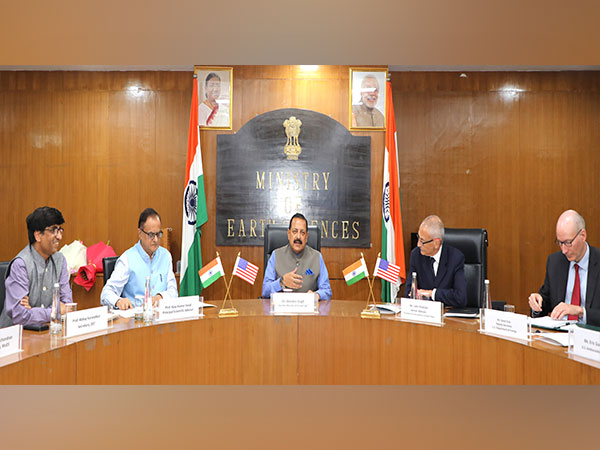India Advances Green Hydrogen Mission and Space Cooperation with US
Union Minister Dr Jitendra Singh emphasised India's commitment to advancing clean energy and space collaborations during the US-India Civil Nuclear Commerce meeting. Key initiatives include the Green Hydrogen Mission, deploying Small Modular Reactors, and an Indian astronaut's upcoming mission to the ISS, marking significant Indo-US partnerships.

- Country:
- India
Union Minister of State for Science and Technology, Dr Jitendra Singh, spotlighted the Green Hydrogen Mission as central to India's decarbonisation strategy for heavy industries, transportation, and power generation. This announcement was made during the bilateral meeting on US-India Civil Nuclear Commerce at Prithvi Bhavan in New Delhi. Singh announced, "India to Enhance Global Climate Goals through Green Hydrogen Mission and SMR Collaborations."
According to the Ministry of Science and Technology, Singh stressed that this initiative is pivotal for driving innovation in clean technologies and fulfilling global climate goals. Strong policy frameworks and international partnerships underpin India's leadership in transitioning to a sustainable energy future. Additionally, Singh revealed that an Indian astronaut from the Gaganyaan Mission is set to join the International Space Station (ISS), a milestone in Indo-US space cooperation.
He stated, "Indian Astronaut Set to join International Space Station Under Indo-US Space Cooperation." This venture underscores the significance of Indo-US collaboration in securing global supply chains, especially in critical areas like semiconductors, pharmaceuticals, and clean energy. Singh also highlighted India's international collaborations focusing on Small Modular Reactors (SMRs), essential for the nation's clean energy transition and energy self-reliance.
Sringh drew parallels between India's "Anusandhan" National Research Foundation (NRF) and the United States' National Science Foundation (NSF), noting their critical roles in advancing scientific research. Reaffirming India's climate commitments, he cited plans to boost non-fossil energy capacity to 500 GW, reduce carbon emissions by 1 billion tonnes, and achieve net-zero emissions by 2070 under Prime Minister Narendra Modi's "Panchamrit" climate action plan.
Dr AK Sood, Principal Scientific Advisor, and Dr Ravi Chandran, Secretary of Earth Sciences, also spotlighted collaborative efforts in ocean energy, Carbon Capture, Utilisation, and Storage (CCUS) technologies, and biomass-to-energy conversion. Professor Abhay Karandikar underscored advancements in data analytics, AI, and machine learning, while Dr N Kalaiselvi highlighted progress in lithium-ion battery technology.
The meeting concluded with a high-level US delegation led by John Podesta and David Turk, reaffirming both nations' commitment to boost cooperation in emerging technologies, aiming to bolster economic growth, national security, and global leadership.
(With inputs from agencies.)
ALSO READ
IREDA's Financial Surge: A Testament to India's Clean Energy Drive
Trump's Energy Agenda Hits Clean Energy Projects
Finland Powers Forward: Last Coal Plant Shut Down Marks a Clean Energy Milestone
CIL Ventures into Lithium for Clean Energy Future
Can Clean Energy Survive a Crisis? Household Fuel Choices in Kyrgyzstan Post-COVID










